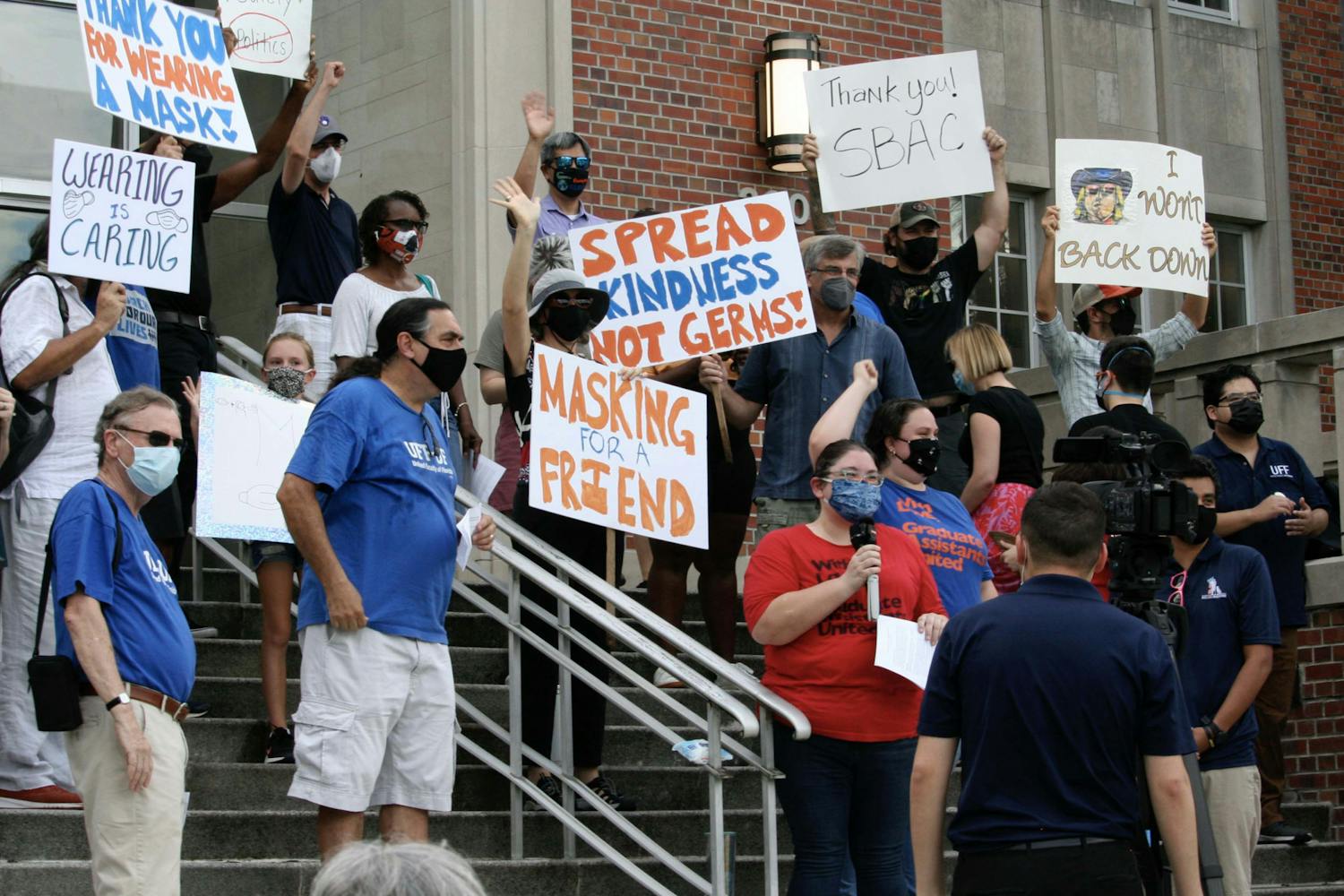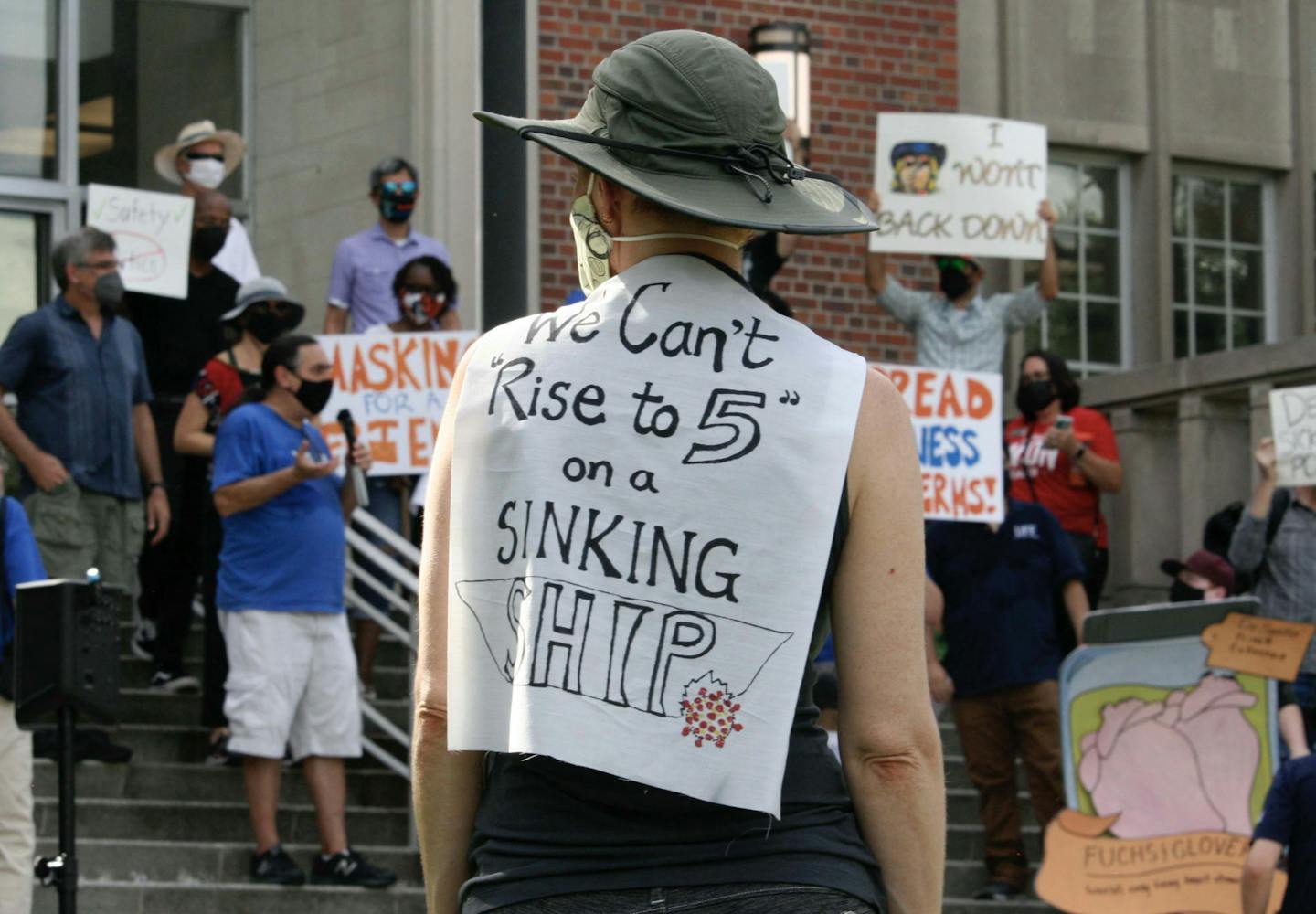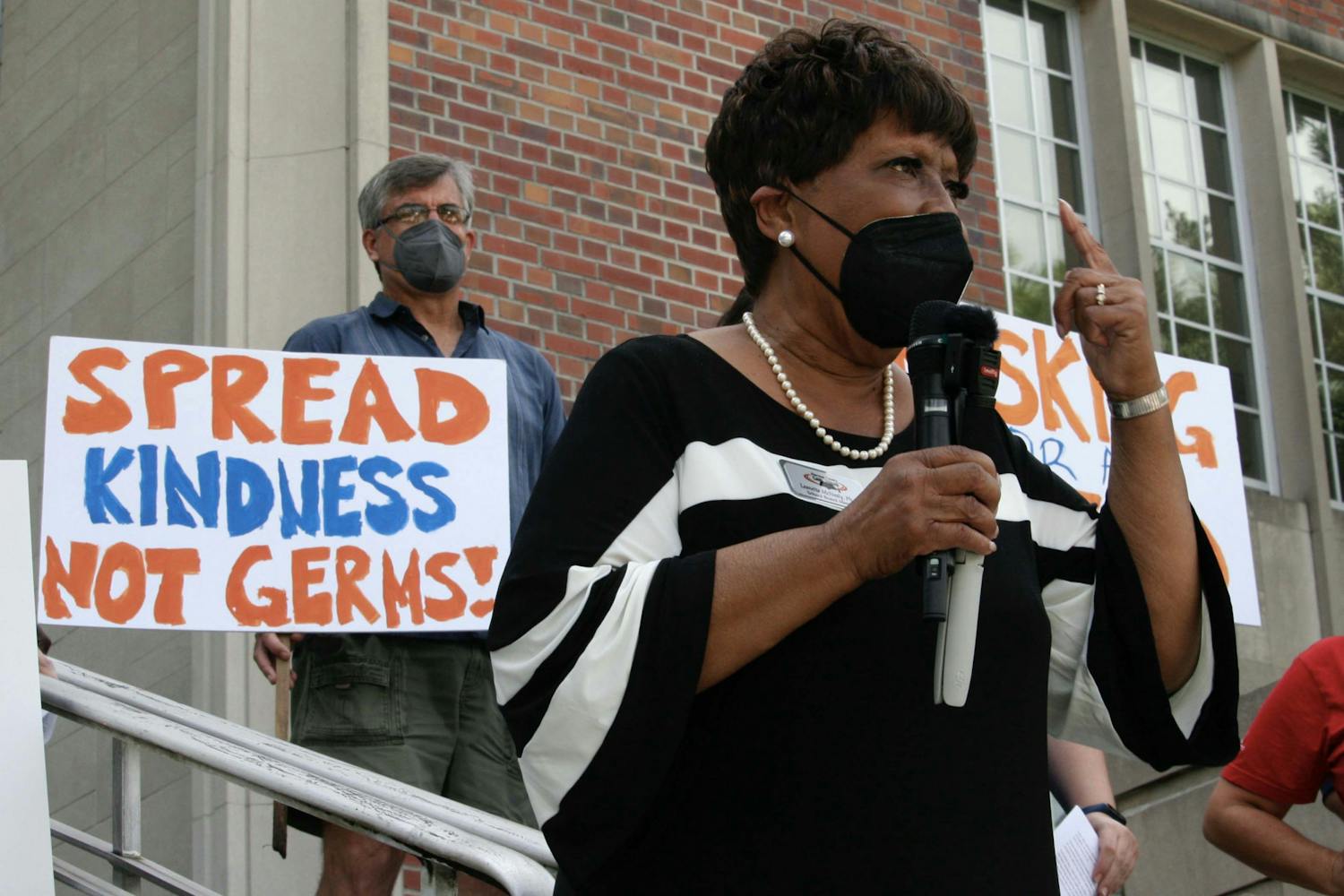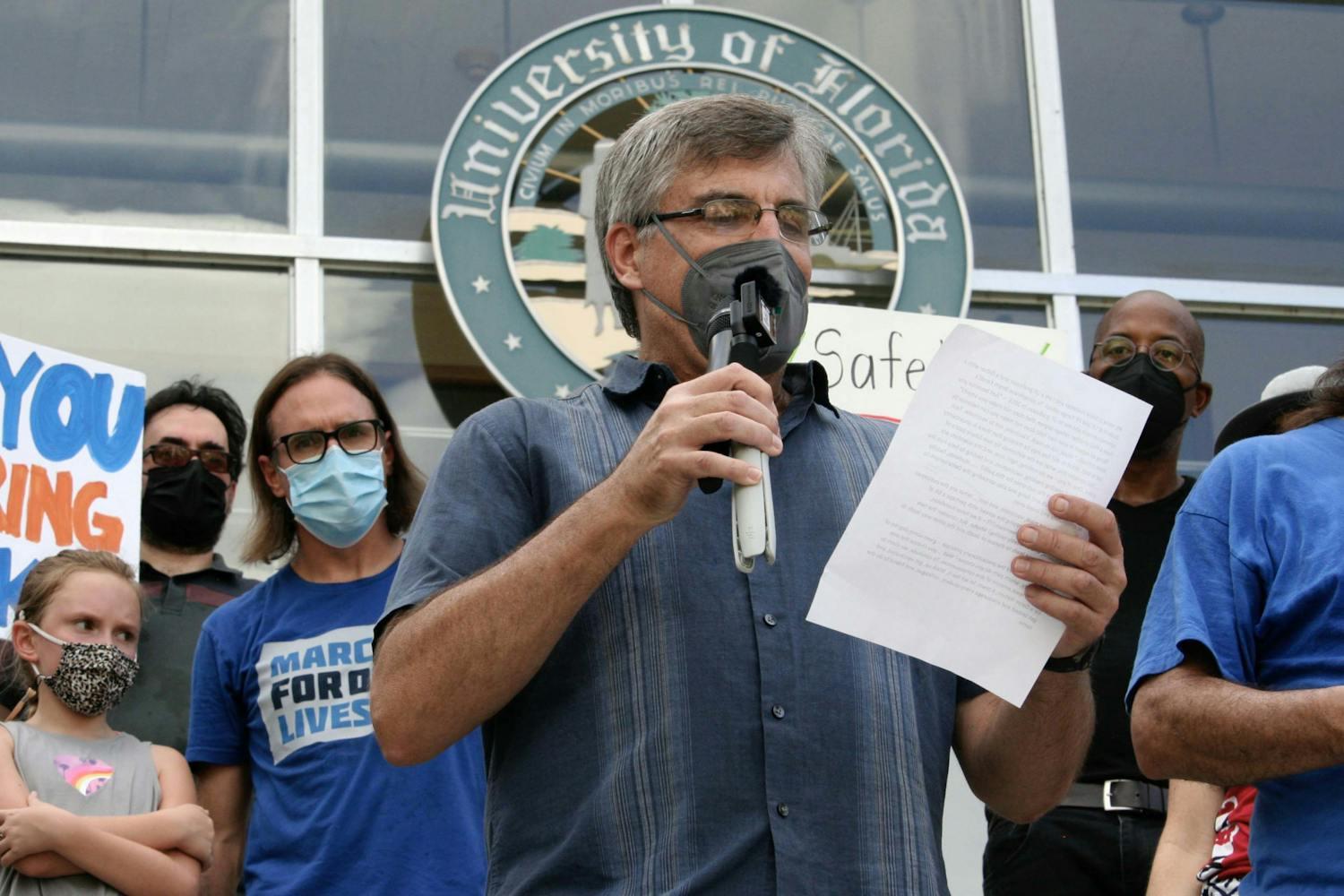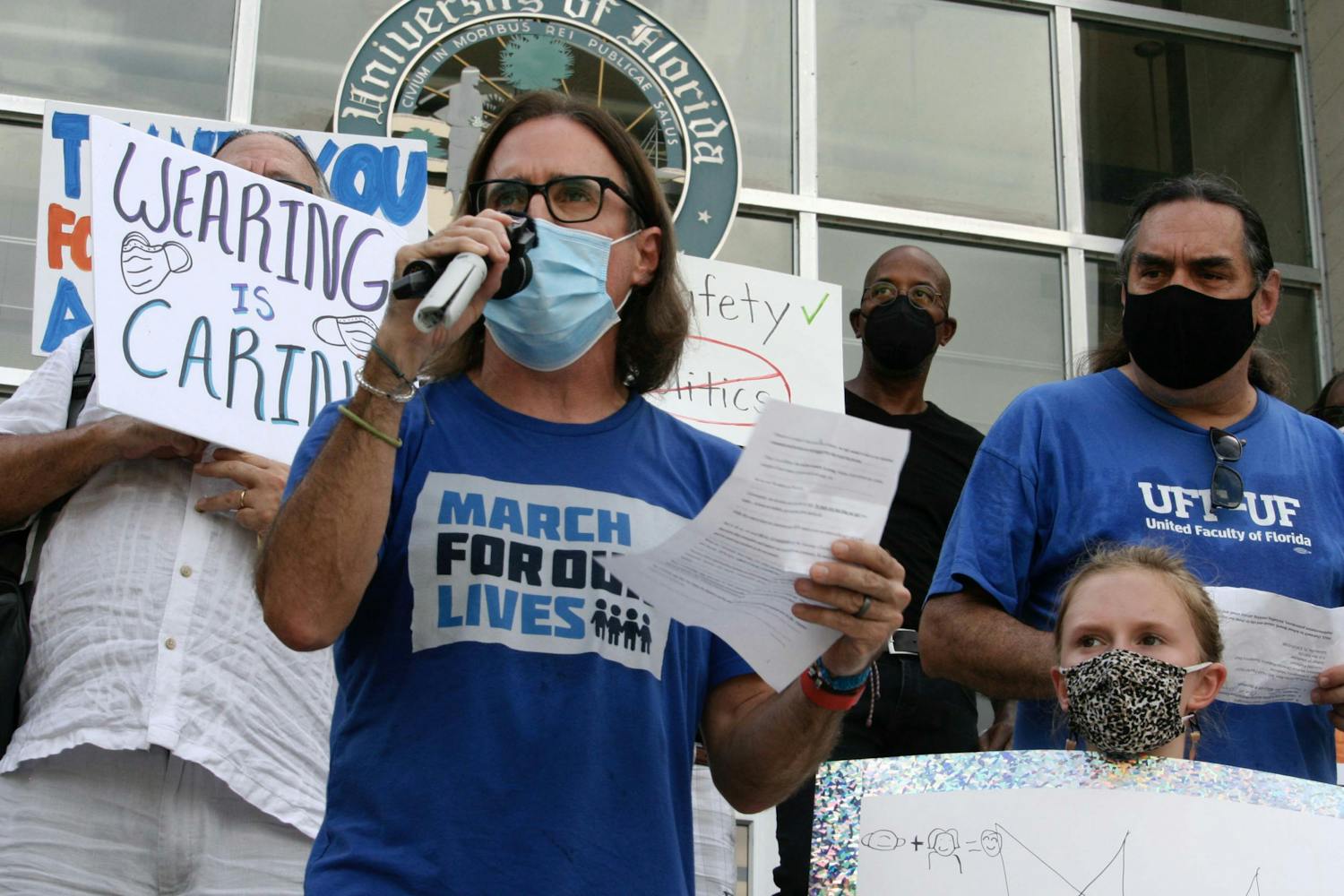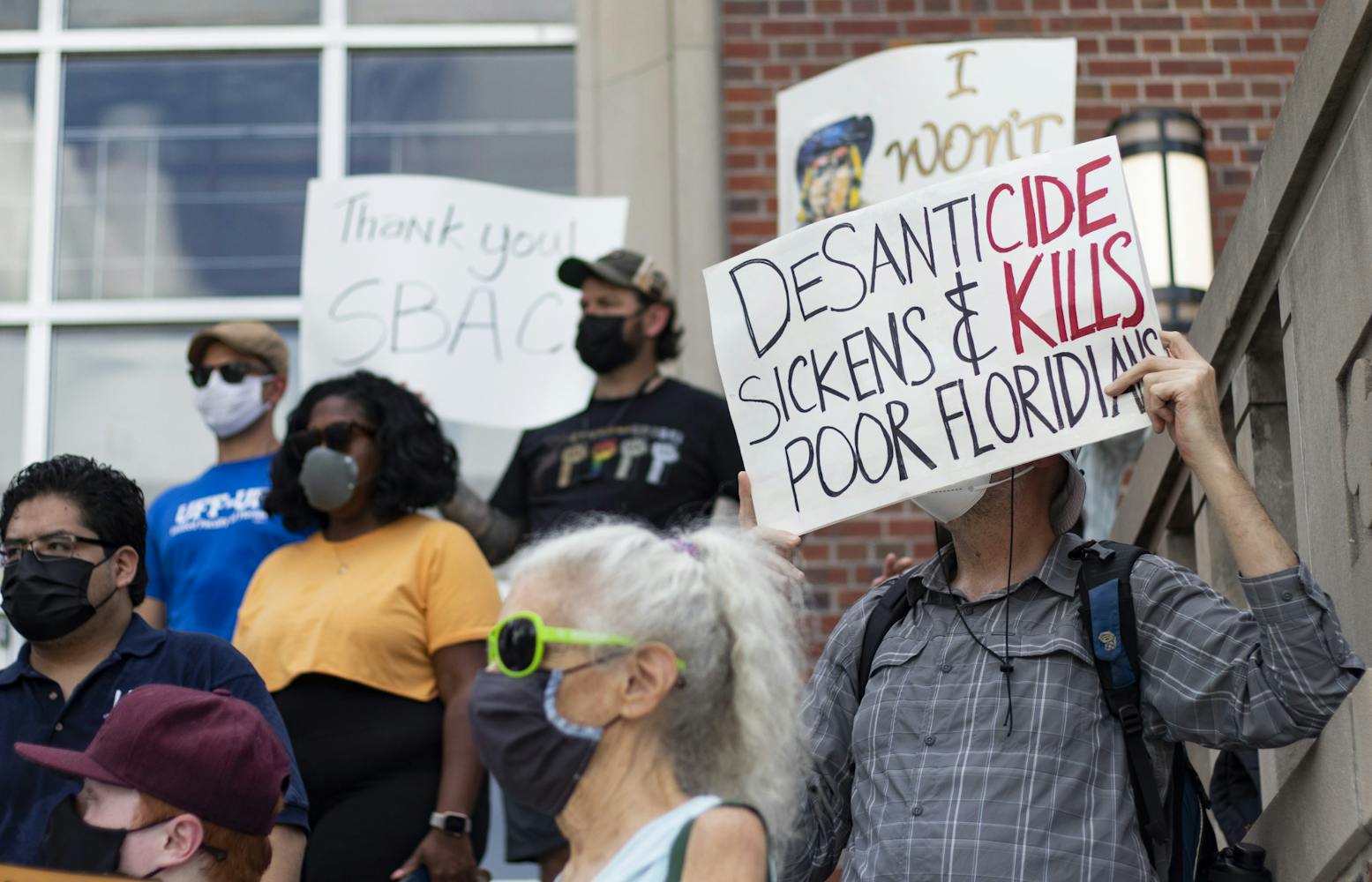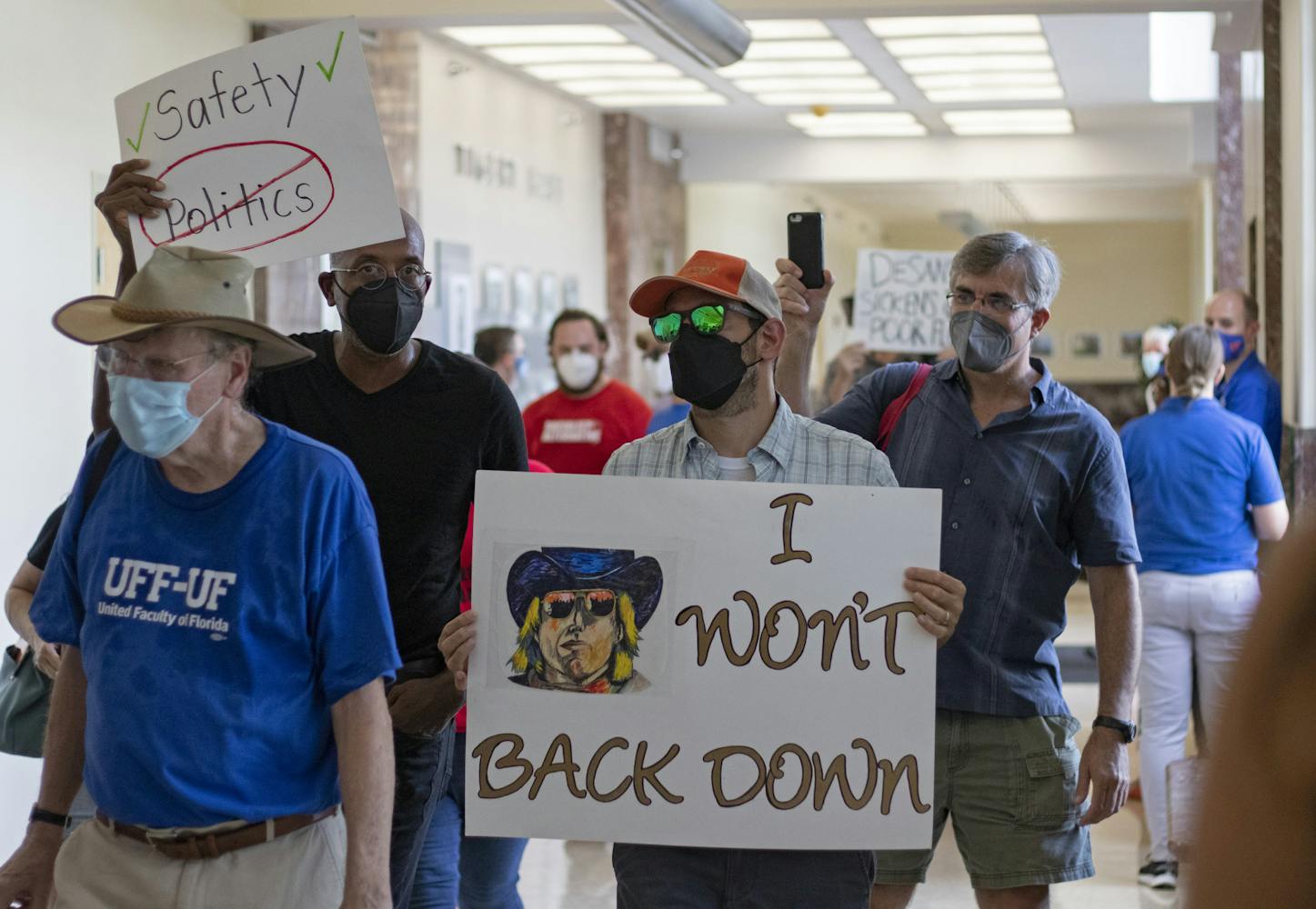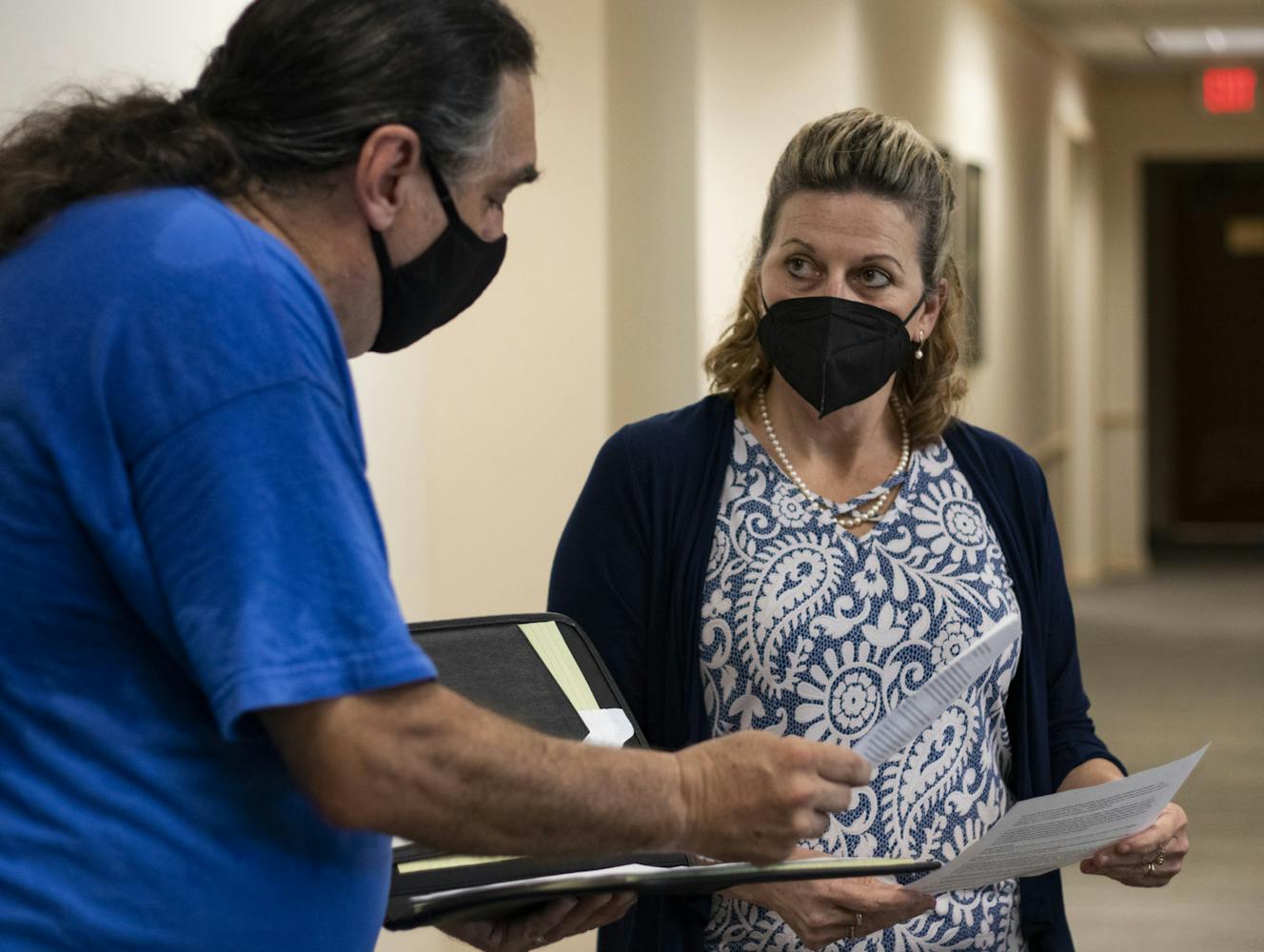UF faculty and staff gathered at the steps of Tigert Hall Aug. 20 to protest the university's COVID-19 policies and demand change as the Fall semester approaches.
Renewed fears of infection come as the virus’ Delta variant spreads, leading UF researchers to predict a new peak in late August or early September. The rally’s organizers, UF’s chapters of the United Faculty of Florida and Graduate Assistants United, hand-delivered their demands to UF President Kent Fuchs’ office.
Their demands included: mask requirements for all indoor gatherings; a vaccine requirement for all faculty, staff and students; an online option for classes during the first three weeks of the Fall semester; and transparent and frequent UF COVID-19 reports.
“We are doing our part to stand up against leadership who refuse to listen to the advice of public health experts,” Meridith Miska, co-president of GAU, said at the rally. “We will continue to fight for the common-sense right to public health and safety requirements, like wearing a mask and getting vaccinated.”
The crowd of about 40 demonstrated a common feeling of frustration with UF administration’s lack of clear communication about its COVID-19 plan for the Fall semester.
Following recent emails announcing contradictory COVID-19 plans, including mask policies and online class options, many faculty were in an uproar on social media over the weeks preceding the start of Fall classes.
The university has insisted it does not have the authority to mandate masks or vaccines, per state guidelines. After the protest, UF spokesperson Hessy Fernandez strongly encouraged everyone to get vaccinated and reiterated the university is expecting everyone to wear a mask inside all UF facilities.
Although masks are expected, they are not required.
“We know members of the UF community have concerns and are facing unique challenges as a result of the pandemic, and we will use the resources and tools available to us to address them,” Fernandez wrote in an email to The Alligator.
Nearly every protest speaker decried Gov. Ron DeSantis for his administration’s COVID-19 policies and battle with Alachua County Public Schools’ mask mandate.
“This governor has decided he’s no longer interested in being governor; he’s interested in running for president,” Gainesville Commissioner David Arreola said at the rally. “We are in a crisis, and the time for politics must be put aside. We have to put our health first, we have to put our safety first.”
Speakers also criticized UF’s administration for choosing Gov. DeSantis’ policy over recommendations from health experts. ACPS implemented a mandatory mask policy, setting an example that protest attendees felt UF should follow.
“I hope that the UFF and all of the people who have good expert sense will follow the Alachua County Public Schools and do what we’re doing,” Leanetta McNealy, Alachua County school board chair, said at the rally. “I’m hoping that the leadership at this great institution will follow what we’re doing.”
The Florida State Board of Education threatened to cut funding for the school board if it continues to require masks in its schools.
Rachel Hartnett, Graduate Assistants United co-president, spoke at the rally. She said she has Type 2 diabetes and fears she’d lose her life if she tested positive for COVID-19 while teaching in person.
“I’m hoping that UF will see sense,” the 33-year-old English Ph.D. candidate said. “I myself will be in a class on Monday; I will ask my students to wear masks, which is all I can do. I will disclose my chronic illness to them hoping that will convince people who are unwilling or reluctant to wear a mask.”
As co-chair of the joint UF, UFF and GAU COVID task force, Hartnett said both organizations have been working together to communicate their dissatisfaction with the university’s COVID response. Prior to the rally, representatives have attended town hall meetings to present their demands to the UF administration.
“We’ve been doing everything — sending emails, trying to get answers and transparency — and so far, nothing has happened,” she said. “There’s been no clear-cut reasoning or explanation, which is why we have been forced to utilize other means.”
At the Aug. 19 faculty senate town hall meeting, Hartnett said neither Fuchs nor UF Provost Joseph Glover gave answers regarding what graduate assistants should do if they test positive for COVID-19. Those questions came after UF recommended instructors use their sick days if they have to quarantine.
But Hartnett said graduate assistants only get five sick days per semester, which is less than the 14-day quarantine time recommended by the CDC.
“So I guess if we run out of those five days and are still showing symptoms, we should just come to campus,” she said.
Co-chair of the UFF-UF COVID task force Steven Kirn said UFF has been presenting to UF administration these demands and filed grievances on behalf of the faculty members for violating the 2021-24 Collective Bargaining Agreement.
Kirn said the CBA explicitly states UF must provide, at minimum, a teaching environment which is safe, secure and healthy.
As part of the state university system, he said UF administration would have to defy the governor and state’s orders like many other universities and schools have but will not, due to the political ties.
“The sense of the collegiality of a community of scholars and learners, and the trust that comes with that has really been disrupted,” Kirn said. “And I think that’s one of the saddest parts of this, is that it’s turned into a political football. And I think faculty feel rather disenfranchised in the process.”
Kirn said UF faculty and staff want to teach, but they are frustrated, sad and disappointed with UF’s decision for the Fall and believes the lack of trust, disconnect and politicization will have a lasting impact in the UF community.
“It’s going to be a long haul effect and I think that is quite unfortunate,” he said. “The kind of corporatization of the university, I think it is very unhealthy.”
UF faculty and staff also participated in an open letter to UF’s administration and the State University System Board of Governors, demanding immediate action to develop a plan for the Fall semester addressing the risks the community may face.
The open letter demands were similar to those communicated at the Aug. 20 rally: enforcement of a mask mandate permission for instructors to move classes online for the first three weeks of the semester, as it was originally planned in an email to students on Aug. 14.
As of Aug. 22, the open letter garnered more than 800 signatures.
Suffering from asthma, 63-year-old UF English professor Malini Johar Schueller, said she was scared for her life upon seeing UF’s email on Fall procedures. She signed the open letter with no hesitation.
“I feel very disappointed and disgusted with this whole mandate because I’ve taught since 1986, and given my life to this university and now it’s like nobody gives a damn,” she said.
COVID-19 is reaching peaks in Florida, and Schueller said many of her friends who are in charge of hospitals’ intensive care units in Florida have expressed how severe cases are in the state.
John Biro, an 80-year-old UF philosophy professor, said he also signed the open letter as he doesn't feel safe teaching in person with the current COVID-19 policies and wishes UF would be more transparent.
“There’s a lot of PR, but no genuine consultation and certainly no evidence of genuine concern,” Biro said.
He has two colleagues, he said, who have been denied permission to teach online and forced to teach in person despite one of them having a young immunocompromised daughter at home and the other being more than 75 years old and also immunocompromised.
“Many colleagues who are desperate to be allowed to protect themselves by teaching online, at least until this surge subsides, and UF’s response is, ‘We don’t care — you do what you’re told,’” he said.
Biro said one of the things he noticed amongst the signatures of the open letter was the lack of names of the younger, untenured UF professors despite their support for these demands.
“I can sign that letter because, even though they can make life unpleasant for me and do unpleasant things to me, ultimately, I feel safer than a young, untenured professor whose job is on the line,” Biro said.
Lauren Diepenbrock, UF assistant professor of entomology and extension specialist, took to Twitter to express her discontent with UF’s lack of enforcing effective health and safety protocols following the death of one of her coworkers Aug. 15.
Despite knowing the backlash she could face, Diepenbrock is not one to keep quiet about significant issues, especially if she disagrees with them, she wrote in an email.
UF Health will administer a third dose of a COVID-19 vaccine only for immunocompromised individuals meeting CDC criteria, UF Health spokesperson Ken Garcia wrote in an email.
However, UF Health strongly encourages everyone who is eligible to get vaccinated, and as soon as boosters are approved by the CDC for everyone, then they will be provided based on eligibility, Garcia wrote.
Contact Christian Casale, Max Taylor and Camila Pereira at ccasale@alligator.org, mtaylor@alligator.org and cpereira@alligator.org. Follow them on Twitter @VanityHack, @MTaylor_Journ and @CamilaSaPereira.

Camila is a third-year journalism student and the administration reporter on the university desk. When she is not reporting for The Alligator, Camila is always listening to music and probably drinking honey milk tea.

Christian Casale is a history senior and the university desk editor for The Alligator. In his spare time, he loves writing his bio for the website and watching movies alone in the dark.

Max is a first year journalism major. In the past, she worked as the Editor-in-Chief of her high school's yearbook, and she is now a News Desk Assistant for The Alligator. When she isn't reporting, Max enjoys reading and rock music.



